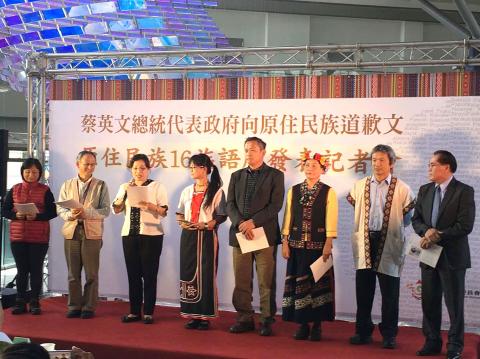Following President Tsai Ing-wen’s (蔡英文) closely watched apology to Aborigines in August, the Council of Indigenous Peoples announced plans to publish a full text of the apology in 18 languages, including 16 officially recognized Aboriginal languages, as well as English and Japanese.
Council Minister Icyang Parod told a news conference in New Taipei City on Wednesday that Tsai’s apology, made on behalf of the government for the discrimination and neglect of Aborigines over the past 400 years, was not only the first step toward reconciliation and peace, but also the first time any head of state in the Asian region has offered an apology to Aborigines, adding that it was historically significant for Indigenous peoples.
The apology, made on Aug. 1, Indigenous People’s Day, was given in Mandarin after a ceremony in front of the Presidential Office Building in Taipei, if front of representatives of Taiwan’s 16 recognized Aboriginal communities.

Photo: Wu Po-wei, Taipei Times
The council assembled a team of 48 translators and linguistic experts to translate the text into 16 Aboriginal languages so that more people could understand the content of the apology.
This took four months to complete, Parod said.
The translated scripts are given with the original text in each version, with pictures of Aboriginal representatives, as well as pictures from the event featuring Tsai, Parod said.
“We plan to publish them soon, which is not only a step toward implementing historical justice and transitional justice for Aborigines, but could also elevate the status of the Aboriginal languages,” Parod said.
It is also the first time that the nation has published an important government document in Aboriginal languages, Parod said, adding that the documents show that the government wants to conserve and advance Aboriginal languages.

Three Taiwanese airlines have prohibited passengers from packing Bluetooth earbuds and their charger cases in checked luggage. EVA Air and Uni Air said that Bluetooth earbuds and charger cases are categorized as portable electronic devices, which should be switched off if they are placed in checked luggage based on international aviation safety regulations. They must not be in standby or sleep mode. However, as charging would continue when earbuds are placed in the charger cases, which would contravene international aviation regulations, their cases must be carried as hand luggage, they said. Tigerair Taiwan said that earbud charger cases are equipped

Foreign travelers entering Taiwan on a short layover via Taiwan Taoyuan International Airport are receiving NT$600 gift vouchers from yesterday, the Tourism Administration said, adding that it hopes the incentive would boost tourism consumption at the airport. The program, which allows travelers holding non-Taiwan passports who enter the country during a layover of up to 24 hours to claim a voucher, aims to promote attractions at the airport, the agency said in a statement on Friday. To participate, travelers must sign up on the campaign Web site, the agency said. They can then present their passport and boarding pass for their connecting international

UNILATERAL MOVES: Officials have raised concerns that Beijing could try to exert economic control over Kinmen in a key development plan next year The Civil Aviation Administration (CAA) yesterday said that China has so far failed to provide any information about a new airport expected to open next year that is less than 10km from a Taiwanese airport, raising flight safety concerns. Xiamen Xiangan International Airport is only about 3km at its closest point from the islands in Kinmen County — the scene of on-off fighting during the Cold War — and construction work can be seen and heard clearly from the Taiwan side. In a written statement sent to Reuters, the CAA said that airports close to each other need detailed advanced

WEATHER Typhoon forming: CWA A tropical depression is expected to form into a typhoon as early as today, the Central Weather Administration (CWA) said yesterday, adding that the storm’s path remains uncertain. Before the weekend, it would move toward the Philippines, the agency said. Some time around Monday next week, it might reach a turning point, either veering north toward waters east of Taiwan or continuing westward across the Philippines, the CWA said. Meanwhile, the eye of Typhoon Kalmaegi was 1,310km south-southeast of Oluanpi (鵝鑾鼻), Taiwan’s southernmost point, as of 2am yesterday, it said. The storm is forecast to move through central